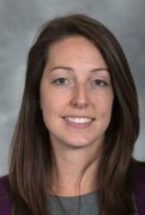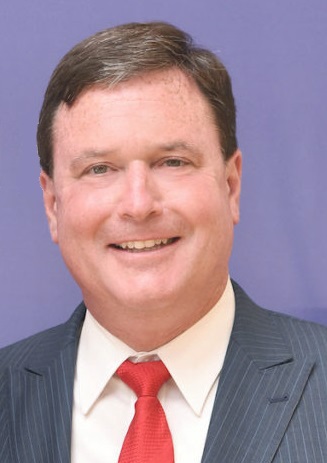Indiana Abortion Doctor Testifies She Properly Reported 10-Year-Old Rape Victim’s Abuse

Kathleen DeLaney, the attorney representing to Indianapolis-based doctors, talked to reporters Monday outside the Marion County Superior Court in Indianapolis.
By Casey Smith
An investigator at the Indiana Attorney General’s Office said in court Monday that the agency is still pursuing consumer complaints against an Indianapolis-based doctor who is at the center of a controversial abortion case.
This despite testimony and evidence that appears to show Dr. Caitlin Bernard communicated with Ohio authorities even before performing the abortion on a 10-year-old girl from Ohio in June. And she notified Indiana Department of Child Services a few days after the abortion.
She and her lawyers argued the complaints are “frivolous” and that she followed all legal and professional protocols.
The case drew national attention and was a major factor in obtaining rape exceptions in Indiana’s new abortion ban.
The court matter stems from an emergency order filed by Bernard and her medical partner Dr. Amy Caldwell. Lawyers for the doctors are trying to block Attorney General Todd Rokita’s office from accessing the abortion patients’ medical records, and also prevent future “unchecked oversteps” by the attorney general.
Marion County Superior Court Judge Heather Welch held an emergency hearing on the injunction request Monday, following an earlier one Friday. The doctors filed their complaint earlier this month — and then an emergency court order last week.
Attorneys for the state concede that Bernard submitted a terminated pregnancy report on time, but emphasized that the doctor should have “immediately” reported to Indiana DCS or local law enforcement her reason to believe that an underage patient was a victim of abuse or neglect.
What does immediately mean?
The attorney general’s office said in court filings that the immediacy requirement conveys “a required strong sense of urgency in action and primacy of purpose in fulfilling the duty to report.” That could mean a need to report such abuse within “hours” of first meeting with the patient.


The law doesn’t define what “immediately” means, however.
Legal documents obtained by the Indiana Capital Chronicle, as well as Bernard’s court filings, say she submitted the terminated pregnancy report to Indiana DCS less than three days after administering abortion-inducing medication to the child.
In her email notification to Indiana DCS, Bernard indicated that the case “was already reported through DCS in Ohio.” Speaking on the stand, Bernard doubled down, saying she communicated and cooperated with law enforcement officials in Ohio from the time she was notified by an Ohio physician seeking help with the child’s case. That was days before Bernard said she first met with the patient in-person.
The social work team at Indiana University Health was looped in “within minutes” of her initial phone call with the Ohio physician who referred the 10-year-old to her office, Bernard continued.
“We work together, including other physicians who advise us and our social work department, to determine what and when any reporting is necessary, and we work together as a team to perform that reporting,” Bernard said.
Katharine Melnick, who supervises the special victims unit at the Marion County Prosecutor’s office, additionally testified on Monday that she would not expect a doctor in Bernard’s situation to report the child abuse to local police or DCS.
Melnick emphasized that Indianapolis police would not have jurisdiction over the case since the abuse happened in Ohio. It would only make sense for Indiana DCS to be notified if the child was to reside in Indiana long-term, she added.
“If it’s already been reported (in Ohio), there is no further duty to report,” Melnick said.
Still, state attorneys argued that if Indiana authorities had been notified earlier, they could have intervened to prevent the 10-year-old girl from having any contact with her abuser upon her return to Ohio.
Extensive hearing
Monday’s hearing lasted nearly five hours. Mary Hutchison, a deputy attorney general and section chief of the attorney general’s licensing enforcement division, was brought to the stand by attorneys for the state and questioned by the doctors’ lawyers for two hours.
Counsel for the attorney general’s office then called Bernard to testify. Questioning from both parties took over an hour and largely centered around the doctor’s timeline for reporting the 10-year-old’s abuse.
The judge has yet to rule on the plaintiff’s motion for a preliminary injunction. Welch said she anticipates making a ruling by the end of next week.
In July, Bernard told the IndyStar she performed an abortion on a 10-year-old rape victim who couldn’t access care in their home state of Ohio following that state’s abortion ban. In response, several conservative figures claimed the doctor was fabricating the story or, at the very least, hadn’t filed the proper paperwork.
A terminated pregnancy report released the next day documented the abortion care received by the girl and an arrest in Ohio soon followed.
But according to Bernard’s lawsuit, Rokita continues to pursue a “baseless investigation” into her office, expanding his inquires to Caldwell. The doctor claims that Rokita used complaints filed against her — after Bernard’s story went public — to launch an investigation into her practice, even though none of the complainants had received care from Bernard, and several didn’t live in Indiana.
Lawyers representing the state said in court last week that the attorney general’s office had concluded its investigation relating to Caldwell.
But Hutchison confirmed in court on Monday that the attorney general’s office is still investigating eight consumer complaints against Bernard. That’s despite scrutiny from Kathleen DeLaney, Bernard and Caldwell’s attorney, who repeatedly noted that the complaints are “meritless.”
Hutchison said she still has lingering questions surrounding Bernard’s “timely” notification to law enforcement about the 10-year-old’s abuse.
The deputy attorney general said her team has been “unable to determine” whether Bernard spoke to Indianapolis law enforcement or Indiana’s Department of Child Services (DCS) “immediately” following her first meeting with the patient.
State attorneys argue Bernard wasn’t authorized to talk to media
Hutchison said Monday she wasn’t previously aware of communication Bernard had with the hospital’s social work team. After she was presented with evidence while on the stand, Hutchison said she still planned to investigate whether Bernard reported to the proper staff.
Further, Hutchison said she is still investigating whether Bernard first obtained written authorization from the patient or a guardian, allowing her to legally share protected health information to the media.
Bernard did not directly address the state’s questions about such authorization while on the stand, but her attorneys maintained it’s acceptable for doctors to share “de-identified” patient information. That’s the kind of information Bernard shared with the media, her lawyers said.
“Dr. Bernard fully complied with all privacy rules,” DeLaney said. “The bottom line is, because Dr. Bernard never disclosed any protected info, she did not violate any privacy requirements.”
Indiana Capital Chronicle is part of States Newsroom, a network of news bureaus supported by grants and a coalition of donors as a 501c(3) public charity. Indiana Capital Chronicle maintains editorial independence. Follow Indiana Capital Chronicle on facebook.com/IndianaCapitalChronicle and twitter.com/INCapChronicle
